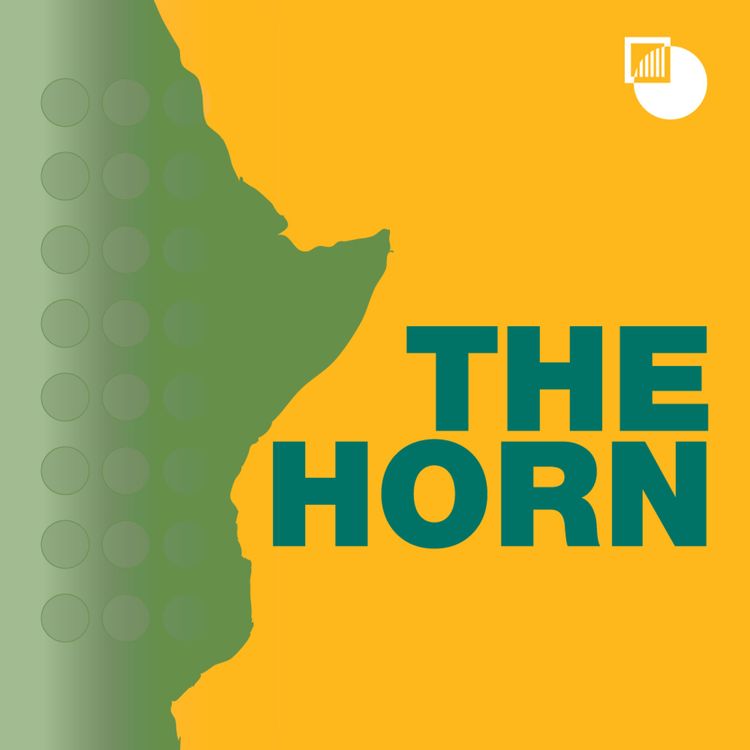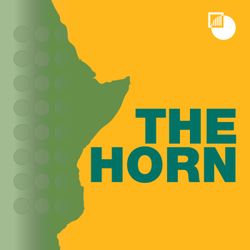Share

The Horn
Behind the Front Lines in Ethiopia’s Tigray
Season 2, Ep. 23
•
Last month, the war in Ethiopia’s Tigray region took a stunning turn as Tigrayan forces retook the regional capital Mekelle. This week, Alan Boswell talks with Declan Walsh, Chief Africa Correspondent for The New York Times, about his reporting at the moment federal forces evacuated Mekelle and his reflections as the conflict continues to escalate and spread.
Walsh offers an on-the-ground look at the Tigrayan forces, the dramatic turnaround in the conflict and how the federal government lost ground in the war. He also discusses his conversations with commanders and soldiers on both sides, while assessing prospects for bringing the conflict to a close.
For more information, explore Crisis Group’s analysis on our Ethiopia page.
More episodes
View all episodes

9. Uganda after Museveni
35:01||Season 7, Ep. 9In this episode of The Horn, Alan speaks with Kristof Titeca, professor at the Institute of Development Policy at the University of Antwerp, to talk about Uganda’s post-election landscape and the question of who might succeed President Yoweri Museveni after nearly four decades in power. They trace Museveni’s rise and unpack how he stabilised Uganda and managed to sustain his rule through patronage, coercion and increasingly personalised decision-making. They examine Uganda’s murky succession politics and Museveni’s son, General Muhoozi Kainerugaba, who is widely seen as the heir apparent and whose rapid military rise and provocative social media interventions have unsettled parts of the establishment. They also weigh various scenarios for a contested succession, whether Uganda’s state consolidation will hold after Museveni leaves, and the impact for the wider region.
8. The Rupture in the Gulf, and its Fallout
35:00||Season 7, Ep. 8In this episode of The Horn, Alan is joined by Crisis Group experts Yasmine Farouk, Omar Mahmood and Shewit Woldemichael. He first speaks with Yasmine about what is behind the new public rupture between Saudi Arabia and the United Arab Emirates in Yemen, how this links to diverging strategies and rising tensions in the Horn of Africa, and the risk of a new Gulf crisis. Alan then turns to Omar and Shewit to discuss spillover into Somalia, including the fallout around Israel’s recognition of Somaliland, and into Sudan, where Riyadh and Abu Dhabi back opposing sides in the war, and what further polarisation and external competition could mean for an already tumultuous Horn of Africa.
7. The Ethiopia-Eritrea Standoff
39:04||Season 7, Ep. 7In this episode of The Horn, Alan is joined by Michael Woldemariam, associate professor at the University of Maryland’s School of Public Policy, to unpack the escalating tensions between Ethiopia and Eritrea. They examine how these dynamics are intertwined with the fragmenting political and security situation in Tigray, Ethiopia’s push for sea access, and Eritrea’s deep-seated existential security concerns. They examine why, despite increasingly hostile rhetoric, war has not yet broken out, and what factors continue to restrain both sides. They also look at whether regional polarisation and global shifts could tip the balance and whether any credible options remain to de-escalate the standoff.
Bonus Episode: Reflecting on Sudan’s Collapse and Elusive Peace
58:36|This week on The Horn, we post a recent discussion between Crisis Group’s CEO and President, Comfort Ero, and leading expert Alex de Waal, about ongoing efforts to bring Sudan’s war to an end.In this bonus episode of The Horn, Alan brings listeners a special episode from a panel on Sudan’s war hosted by Crisis Group earlier this month at the Qatar Mediation Forum, a sideline event at the Doha Forum. The discussion is moderated by Yasmine Farouk, Crisis Group’s Gulf Director, and features Comfort Ero, Crisis Group’s President and CEO, alongside Alex de Waal, a leading expert on Sudan. They examine why Sudan’s war is so hard to stop, looking at repeated past failures to secure a ceasefire. They discuss how state authority has eroded across large swathes of the country, what the paramilitary Rapid Support Forces’ model of control looks like and how the war has become an internationalised proxy struggle shaped by Gulf, regional and global interests. They also debate the merits and limits of the current mediation architecture, including with formats like the Quad. They explore the risks of transactional engagement, the dilemmas around arms flows and embargo proposals, and the difficulty of making peace between fractious coalitions. Finally, they reflect on the scale of the humanitarian catastrophe in Sudan and highlight Sudanese-led resilience efforts, from emergency response rooms to local market and food-production adaptations, as essential to sustaining lives even as the politics remain deadlocked.
6. Global Disorder, Horn of Africa Turmoil. Can Europe Keep Up?
38:01||Season 7, Ep. 6In this episode of The Horn, Alan is joined by Heiko Nitzschke, Germany’s special envoy for the Horn of Africa, to discuss whether and how Europe needs to adapt its approach towards the Horn of Africa. While Europe used to act in relative sync with the U.S. in Africa, this is increasingly less the case. Meanwhile, numerous other powers, mostly from the Middle East, are pursuing their own objectives. Amid all this, how does Europe avoid going it alone in the Horn of Africa region? And, amid these shifts, is Europe rethinking longstanding policy ideas around development, multilateralism and mediation?This episode is produced in partnership with the Friedrich-Ebert-Stiftung.For more, check out our Horn of Africa page.
5. The El Fasher Atrocities
29:27||Season 7, Ep. 5In this episode of The Horn, Alan speaks with Julia Steers, investigations editor at Lighthouse Reports, about the large-scale atrocities that took place in Darfur’s El Fasher after the paramilitary Rapid Support Forces (RSF) captured the city from Sudan’s army last month. They retrace how the RSF’s seizure of El Fasher unfolded after months of siege and discuss what investigators have uncovered about the mass killings and widespread abuses that followed. They examine the scale and brutality of the attacks on civilians – many of them documented by the RSF themselves – and the ethnic pattern of the killings. They also explore the RSF’s motivations for the apparent coordinated and systematic mass killing, and how the group has responded to the reporting on these atrocities.For more, check out Lighthouse Reports’ publication “The Killing Fields of Al Fashir”, co-published with Sky News and Sudan War Monitor, our Hold Your Fire! episode “What Does the RSF’s Seizure of El Fasher Mean for Sudan’s War?” and our Sudan country page.
4. Mediators’ Brave New World
43:00||Season 7, Ep. 4In this episode of The Horn, Alan is joined by Timur Söylemez, former ambassador and former head of the mediation unit at Türkiye’s foreign ministry, to discuss the evolving landscape of conflict mediation and Ankara’s approach in the Horn of Africa and beyond. They unpack the headwinds facing mediators today amid proliferating conflicts, shrinking space for comprehensive peace deals and rising scepticism toward multilateral bodies. They explore how Türkiye chooses where to engage, how its approach differs from that of the U.S., EU and Gulf states, and favouring results over process. They also examine Türkiye’s efforts in the Horn, including its mediation between Somalia and Ethiopia, and its exploration of peace talks on Sudan, as well as how Ankara cooperates with other mediators from the U.S., Europe and the Gulf.This episode is produced in partnership with the Friedrich-Ebert-Stiftung.For more, check out our Türkiye and Horn of Africa pages.
Bonus Episode: What Does the RSF’s Seizure of El Fasher Mean for Sudan’s War?
24:41|Today we're bringing you a bonus episode on the fall of El Fasher in Sudan from Crisis Group's Global Podcast Hold Your Fire!.In this update episode of Hold Your Fire!, Richard speaks with Crisis Group’s Sudan expert Shewit Woldemichael and Horn director Alan Boswell about the paramilitary RSF capturing North Dafur’s capital El Fasher, the reports of horrific violence in the city and the implications for the trajectory of Sudan’s war. They discuss how the RSF managed to take control of the city after a siege of more than a year and the situation in El Fasher now amid a worsening humanitarian crisis and reports of mass killings of civilians. They discuss the de facto partition of Sudan with the RSF now controlling most of western Sudan and the army holding the capital Khartoum and the east. They also explore whether the capture of El Fasher may derail U.S.-led efforts to broker a ceasefire.For more, check out our recent episode Can a U.S.-Arab Roadmap Stop Sudan’s War? And our Sudan country page.
3. The Trial of South Sudan’s Vice President Riek Machar
33:54||Season 7, Ep. 3In this episode of The Horn, Alan is joined by Edmund Yakani, executive director of the Community Empowerment for Progress Organization, to discuss the trial of South Sudan’s first vice president and former rebel leader Riek Machar. They trace Machar’s rise and how he became a central, polarising figure in South Sudanese politics. They unpack the charges against Machar over his alleged role in a March 2025 attack on an army base in Nasir. They discuss the timing of the proceedings as South Sudanese elite jockey over the eventual succession of President Salva Kiir amid mounting speculation over his health. They also explore what to expect from the trial, what its outcome could mean for the risk of deepening violence and for the 2018 peace deal, and whether there remains a viable path to dialogue among South Sudan’s elites to ease tensions.For more, check out our Analyst’s Notebook “Criminal Charges against South Sudan’s Vice President Threaten New Twist in Conflict”, our recent episode “As South Sudan Quakes, an Heir Apparent Rises”, and our briefing “Succession Fever Deepens South Sudan’s Malaise”.